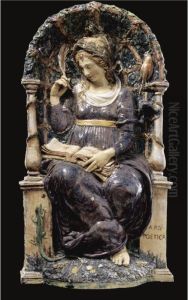Edouard Avisseau Paintings
Édouard Avisseau was born in 1822 in Tours, France, into a family with a strong tradition in pottery. The Avisseau family is particularly noted for their contribution to the revival of interest in traditional pottery techniques during the 19th century, especially in the region of Tours. Édouard, following in the footsteps of his father, Charles-Jean Avisseau, became a prominent figure in the field of French ceramics, contributing significantly to the art of pottery during his lifetime.
Throughout his career, Édouard Avisseau was deeply influenced by the natural world, which is vividly reflected in his works. He specialized in creating pieces that mimicked the textures and forms found in nature, often incorporating motifs of fish and other wildlife into his pottery. This thematic choice not only showcased his technical skill and creativity but also resonated with the broader artistic movements of the time that emphasized a return to nature and the exploration of natural forms for inspiration.
His work was characterized by a meticulous attention to detail and a masterful use of glazes to achieve vibrant colors and lifelike textures. Avisseau's contributions were instrumental in the revival of the Palissy style, named after the 16th-century French potter Bernard Palissy, known for his highly detailed and realistic representations of flora and fauna in ceramics. Édouard Avisseau's dedication to this style helped to rekindle interest in Palissy ware among collectors and artists alike during the 19th century.
Édouard Avisseau's legacy is not just limited to his artistic achievements but also includes his role in nurturing the next generation of potters. His workshop in Tours became a center for learning and innovation, attracting many apprentices who would go on to make their own contributions to the world of ceramics. Despite the challenges posed by industrialization and the changing tastes of the era, Avisseau managed to sustain the traditional craft of pottery making and passed it down to future generations.
He died in 1901, leaving behind a rich body of work that continues to be celebrated for its artistic excellence and historical significance. Through his dedication to the craft of pottery, Édouard Avisseau played a pivotal role in preserving and advancing the traditions of French ceramics, making a lasting impact on the field that is still appreciated by historians and collectors today.
